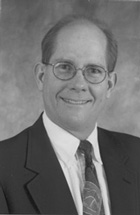 UNMC researcher Tony Hollingsworth, Ph.D., answers questions about his work, life and interests.
UNMC researcher Tony Hollingsworth, Ph.D., answers questions about his work, life and interests.
NOTE: This profile is part of a series highlighting the 25 researchers who were named UNMC Distinguished Scientists for 2006. Each of these researchers will be profiled in UNMC Today leading up to a March 12 ceremony to recognize their achievements.
- Name: Tony Hollingsworth, Ph.D.
- Title: Professor at the Eppley Institute
- Joined UNMC: 1991
- Hometown: Ft. Lauderdale, Fla.
Describe your research in 25 words or less.
We work on pancreatic cancer and are trying to understand why this disease is so deadly by studying how the tumors invade and metastasize. We also are developing new diagnostic tests and therapies for pancreatic cancer.
How did you decide to pursue this area of research?
I decided to work on this because it was a difficult area of research, a deadly disease, and few people were working on it.
When did you realize you were interested in research?
I realized I was interested in research in high school, and by the time I got to college I knew that I wanted to be a research scientist and professor.
What are the greatest challenges in research today?
The greatest challenges are manpower and funding. We have many problems to solve and not enough people and money to do the job we should do.
Best advice for new researchers?
You must be persistent in what you do. Catch a vision for your research and stick to it through thick and thin. Have fun and take pleasure in your work.
When an experiment stalls, what drives you to continue on?
It depends on how the experiment stalls. Many times the answer to the hypothesis that is being investigated is, “no,” and an answer of “no” can be progress. If the experiment fails repeatedly because it is difficult and we haven’t done something correctly, we need to try another approach.
Who has been your greatest teacher?
I had a number of great teachers. My parents taught me a lot but also gave me the freedom to follow the career that made me happy. A high school biology teacher named Dan Wells showed me the creative side of science. A band instructor named Fred Humphreys taught me how hard work could produce outstanding products and to not settle for mediocrity in anything. My graduate mentor Don Evans taught me to persist and laugh in the face of adversity. My postdoctoral mentor, Dick Metzgar, taught me how to be a successful research scientist, how to enjoy a career in this area and how to foster an environment of creativity in a big lab.
Tell us about your hobbies outside the lab.
My favorite sports are cycling, skiing, scuba diving and hiking. I exercise every day and love it! I lift weights, run and swim. I also love music. I play the piano, like to sing, and love to attend concerts (all kinds). I like to talk to family and friends and help people in need. I enjoy traveling around the world, meeting lots of new people and experiencing different cultures.
Globally, describe the most notable research achievement ever?
After helping to discover a molecule that plays a role in the biology of pancreatic cancer (MUC1), we have learned a lot about its function (it protects the cell surface and sends information about the cell surface to the nucleus) and we are using this information to try to design tumor vaccines and to make better diagnostic reagents for pancreatic cancer.
Clarify a common misconception about research?
Most people think we have a lot of knowledge — in fact we know very little and need to know much more.
What would you tell a student interested in a research career?
Make sure that you have the right personal qualities. You need to be creative, hard working, persistent and enjoy the challenge of the unknown. You need to take pleasure in things that progress slowly and you need to understand that your ideas are wrong 90 percent of the time (but that is OK)!
List three things few people know about you.
- I can cook;
- I got a C in enzymology in graduate school; and
- I have jumped out of an airplane (with a parachute).